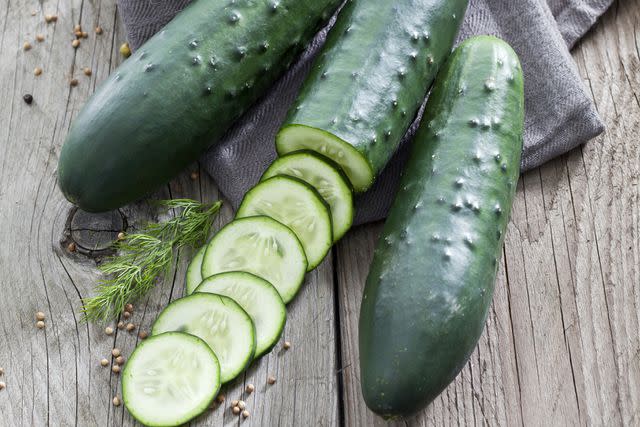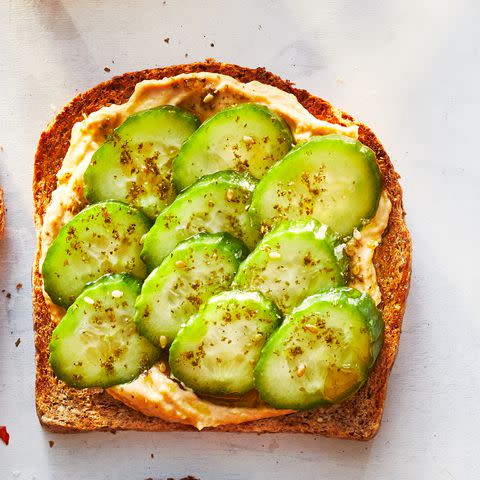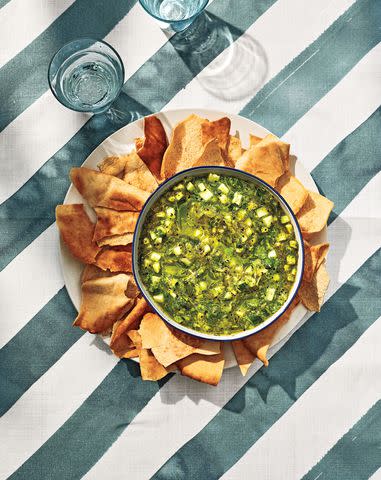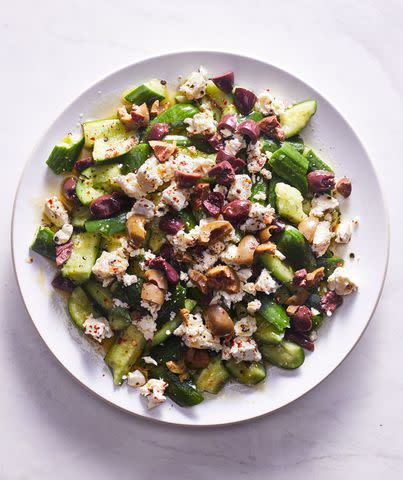10 Health Benefits of Cucumber that Make Them So Good For You
You're about to crave cucumbers like never before.
Fact checked by Emily PetersonMedically reviewed by Kristy Del Coro, MS, RDN, LDN
Whether starring in a salad or dipped in creamy hummus, crunchy, refreshing cucumber (Cucumis sativus) is tough to resist. But this “veggie”(which is actually a fruit!) offers so much more than delicious, mild flavor and a textural element to dishes: Cucumbers are also full of healthy nutrients. In fact, eating cucumbers can keep you hydrated, reduce inflammation, and lower blood sugar, and more. We caught up with health experts to learn more about the health benefits of cucumbers—and we've rounded up recipes to add more of them to your diet.
Meet the Experts
Dana Melink, RD, is a clinical dietitian.
Lauren Manaker is a registered dietitian nutritionist (RDN) in Charleston, South Carolina.
Cucumber Nutrition
As a global culinary staple for over 3,000 years, cucumbers originated in India, and their popularity soon grew, first across the Asian continent and then around the world. Cucumbers belong to the Cucurbitaceae family alongside squash, zucchini, watermelon, and pumpkin—so technically they’re a fruit. Although there are over 100 varieties available, here's a look at the nutritional value of your average raw cucumber with a peel. (Keep in mind that cucumbers are most nutritionally dense when unpeeled!).
Water - 287 grams
Calories - 45.2 kcal
Protein - 1.96 grams
Fat - 0.331 grams
Carbohydrates - 10.9 grams
Fiber - 1.5 grams
Sugars - 5.03 grams
Sucrose - 0.09 grams
Glucose - 2.29 grams
Fructose - 2.62 grams
Starch - 2.5 grams
Calcium - 48.2 milligrams
Iron - 0.843 milligrams
Magnesium - 39.1 milligrams
Phosphorous - 72.2 milligrams
Potassium - 442 milligrams
Sodium - 6.02 milligrams
Zinc - 0.602 milligrams
Copper - 0.123 milligrams
Manganese - 0.238 milligrams
Vitamins A, B, C, E, and K

Westend61
Cucumber Health Benefits
Here are some of the most noteworthy reasons to keep crunching on cucumbers.
Hydrate
If you’ve been privy to any of the health impacts of cucumbers, you may know that they’re filled with water. “Cucumbers are high in water content, helping to keep you hydrated,” says clinical dietitian Dana Melink, RD explains. In fact, they’re made up of at least 95 percent water, making them one of the most hydrating foods you can eat. Given that our bodies are also made of mostly water, hydration is key to keeping all of our organ systems functioning well, particularly our kidneys. It also helps us to maintain healthy blood pressure and keeps our detoxifying systems firing on all cylinders.
Boost Bone Health
With every serving of cucumbers, you’ll get closer to your daily vitamin K needs, which is important for healthy bone development. It is a vital precursor to the protein osteocalcin, which is needed to create bone tissue. Vitamin K also supports healthy blood clotting throughout the body.
Reduce Inflammation
“Cucumbers are also full of antioxidants,” Melink says. Like many other plant-based foods, cucumbers are packed with plant compounds, or polyphenols, especially lignans and cucurbitacins. These plant compounds fight off inflammation throughout the body as well as free radicals, which can be the cause of chronic diseases like heart disease and cancer. And research finds that cucurbitacins are effective at not only killing cancer cells, but also at preventing their proliferation through the body.
Aid Digestion
Their water content combined with their fiber content make cucumbers a healthy food to eat to support digestion. Cucumbers are especially high in soluble fiber, which promotes regularity and healthy metabolism while also working to reduce cholesterol levels. Water is vital for proper digestion because it helps the body break down and absorb nutrients. It also helps to prevent constipation and bloating.
Improve Immune System
Cucumbers contain modest, but still noteworthy amounts of both vitamin C and potassium. Vitamin C, also an antioxidant, helps boost the immune system. Potassium helps boost cucumbers’ hydrating powers, because this mineral is an electrolyte that works to maintain fluid balance throughout the body.
Regulate Blood Sugar
Cucumbers can also aid in the regulation of blood sugars and prevention or maintenance of diabetes. One review published in the Journal of Complementary and Integrative Medicine found that cucumber consumption was associated with better blood sugar control, having anti-diabetic effects. Also of note, one animal study found cukes to be protective against inflammatory side effects of diabetes, decreasing oxidative stress throughout the body.
Enhance Skin
Since cucumbers have a high water content, they help keep your body hydrated, and in turn, moisturize the skin, says Lauren Manaker, a registered dietitian nutritionist (RDN). And because they are a good source of antioxidants and vitamin C, which may help protect against oxidative stress that causes skin damage, cucumbers may be good for your skin health, Manaker says.
Freshen Bad Breath
Some plant based foods, like cucumber, have flavonoids and tannins, which contain antibacterial properties that help neutralize bacteria in your mouth, possibly reducing bad breath, Manakar explains. And chewing triggers saliva production, which does help reduce odors, Manakar says. "While we need more high quality data to confirm whether cucumbers should be a go-to remedy for bad breath, it is a low-risk intervention that won't hurt and may help (unless you are eating cucumber slices doused in garlic powder or topped with tuna and onion—then it won't be the bad breath remedy you are looking for!), Manakar says.
Aid Weight Loss
Cucumbers are a low-calorie snack, which means that they may help aid weight loss for some people who are trying to lose weight. Because cucumbers are so hydrating, as well, they can help to keep you full for longer. Plus, you can add cucumber to water, which may make it more enticing to drink for some people. And a wealth of research suggests that drinking enough water helps aid weight loss, as well.
Promote Hair Growth
Cucumber is packed with silicon and sulfur, as well as potassium, all of which are known to prevent hair growth and stop hair loss. Silicon and sulfur, in particular, are ingredients in many hair products because they prevent hair brittleness and breakage. Silicon strengthens hair shafts, reducing breakage and giving hair shine, while sulfur is essential in the production of keratin, which is a protein that makes up hair, giving it its flexibility and durability. We need these minerals to nourish the scalp and promote faster and healthier hair growth—and you can consume them in cucumbers.
Common Types of Cucumbers
As mentioned before, there are so many different types of cucumbers to choose from or even grow in your garden this summer.
English cucumbers (or hothouse cucumbers): Often found individually wrapped in plastic in the grocery store, the skin of these long, dark green cucumbers is thin and intended to be consumed (after washing).
Japanese cucumbers: These dark-green, narrow cucumbers have bumpy skin that’s also thin enough to be eaten without peeling.
Persian cucumbers: This type is shorter and fatter than an English cucumber but looks very similar and still delivers on the crunch factor. No need to peel, and you can find them readily in the grocery store.
Armenian cucumbers: Also called snake cucumbers, Armenian cucumbers are beautifully striped with dark- and light-green, furrowed lines. They make for the perfect snacking or pickling cukes.
Lemon cucumbers: This type of cuke you may only find at farmers’ markets—and if you do, you should definitely give it a try. Lemon cucumbers get their name from their size and shape reminiscent of the sour fruit, though with paler color. That’s about all the similarities as you can expect between the two fruits however, as these cucumbers offer a sweet, delicate flavor
Shopping for Cucumbers
Generally, when you’re purchasing cucumbers, try to buy organic (many non-organic cucumbers are often coated in edible wax for preservation at the supermarket), or at least avoid the ones with the thick, wax-coated skin. To get the most nutrition out of your cucumber it’s ideal to consume the skin, but doing so with the waxy coating can be unpalatable and makes it harder to properly clean since germs tend to stick to the wax.
"Once you have your hands on some great options, cucumbers’ “versatile and neutral flavor make them easy to incorporate into your daily routine,” Melink says. "Whether it be pickling, dipping in your favorite spread, or adding to salads, salsas, or sandwiches, there’s so many ways cucumbers can seamlessly fit into your healthy lifestyle."
Fresh and Easy Cucumber Recipes
In case you're not sure where to get started with cucumbers, as there is so much you can do with them, we've listed some of our favorite recipes. Try these out the next time you reach for one.
Hummus and Cucumber Toast

Whip up this quick and tasty toast in just a couple of minutes.
Almost Hands-Free Pickles

Try these, and you'll never want to buy store-bought pickles again.
Kiwi-Cucumber Relish

Liven up your fish with this refreshing relish.
Sweet Chili Salmon With Cucumber Salad

Need a quick weeknight meal? Try this satisfying dish.
Smashed Cucumber Salad with Spicy Feta and Olives

Salty, crunchy, and spicy—what more could you ask for?
Celery, Cucumber, and Pineapple Juice Smoothie

Take one sip, and you'll be hooked.
Related: How to Store Cucumbers So They Stay Super Fresh
For more Real Simple news, make sure to sign up for our newsletter!
Read the original article on Real Simple.

 Yahoo Autos
Yahoo Autos 